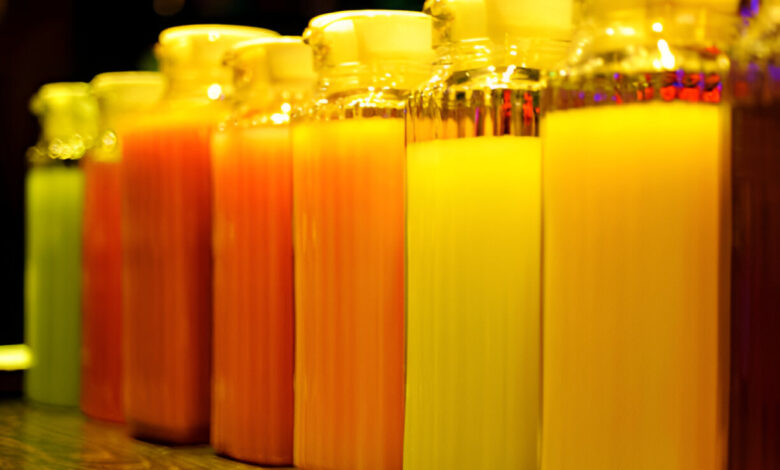Is V8 Juice Actually Good For You?

Many people struggle to get enough vegetables in their diet. V8 is a popular vegetable juice that may help you get more nutrients into your body. But is it perfect for you? According to Healthline, V8’s original flavour contains juice from eight vegetables, including tomatoes, carrots, beets, celery, lettuce, parsley, spinach, and watercress. Each of those veggies contains many health benefits, which means V8 is an excellent source of many vitamins and minerals. This includes potassium, vitamin A, and vitamin C. One 8-ounce glass of V8 contains only 45 calories.
Another benefit of consuming V8 is that it contains small amounts of sugar, especially compared to other juices and juice drinks available. This is because it is made from vegetables that have little sugar, and the drink has no added sweeteners. Finally, the drink contains many antioxidants from all the vegetables. “Antioxidants can be found in a range of fruits and vegetables and can contribute to protecting our bodies against chronic conditions like cancer and cardiovascular disease,” Morgan Brod, RD, CDN, told Eat This, Not That!
With that said, there are some potential drawbacks of consuming V8, including its high sodium content, its potential to trigger diarrhea, and more. So what’s the deal? Continue reading to discover some of the pluses and minuses of consuming this popular drink.
It’s lower in sugar and calories than other drinks.
As mentioned, one of the benefits of consuming V8 is that it is relatively low in sugar. If your first instinct when you’re thirsty is to reach for a sugary soft drink, sports drink, or fruit punch, then V8 may represent a much healthier alternative to quench your thirst. Verywell Fit experts agree and confirm this fact by saying that it is “substantially lower in sugar” than the beverages above, with only 7 grams of sugar per 8-ounce serving compared to 39 grams of sugar found in a 12-ounce can of soda.
The health dangers of consuming too much sugar have been well documented over time, and unfortunately, drinking your sugar is one of the worst ways to consume it. Healthline explains that fructose is the form of sugar most often found in sweetened drinks and that it does not lower your hunger levels the same way as other foods. Therefore, when you drink sugar-laden drinks, you may end up consuming more calories on top of your meal because those drinks don’t actually fill you up. Furthermore, the site explains that drinking sugary drinks can contribute to a buildup of fat in the liver, which can lead to fatty liver disease. It is also linked to type-2 diabetes and obesity.
It’s a source of complex carbohydrates.
Another upside to drinking V8 is that it is an excellent source of complex carbohydrates. Verywell Fit explains that one serving of V8 contains 10 grams of complex carbohydrates and that when compared to the simple carbohydrates found in sweetened drinks, the complex carbs found in V8 give you a longer-lasting boost of energy.
So, you might be wondering — what is a carbohydrate anyway, and why does it really matter if it’s simple or complex? Healthline breaks it down further by explaining that carbohydrates serve as one of the primary sources of energy for our bodies and are considered a significant macronutrient.
While you may have seen carbs vilified by dieters seeking to lose weight, certain types of carbs are actually good for your health and shouldn’t be cut out. Complex carbohydrates are formed from a trio of fibre, starch, and sugar, while simple carbs are just made from sugar. Simple carbs offer very little nutritional value and, as previously mentioned, can lead to weight gain and type 2 diabetes. According to Healthline, sources of simple carbohydrates to avoid include packaged cookies, breakfast cereal, and — you guessed it, fruit juice and soda. Because V8 is a source of complex carbohydrates, it can help you stay fuller for longer and is a better way to manage weight.
It has a lot of sodium.
With all the benefits V8 offers, it comes with some drawbacks as well. Suppose you are thinking about completely replacing your daily vegetable serving with V8. In that case, you should consider the following: In order to add flavour to the drink and preserve its ingredients, the V8 manufacturers add a considerable amount of sodium to the beverage. According to Medical News Today, one 8-ounce glass of V8 has 640 mg of sodium, which is almost one-third of your daily recommended intake.
Experts at Harvard Health explain that sodium is commonly used to flavour food. It also acts as a preservative. It’s actually needed in specific quantities in the body to facilitate the functioning of nerves, to help with muscle movement, and more. However, if there is too much sodium in the body, it can cause high blood pressure, as well as lead to heart disease and stroke. Furthermore, if you consume too much sodium, your kidneys have a hard time filtering out the excess, and your body ends up retaining water in order to dilute it. This can then lead to an increased volume of blood in the bloodstream, a stiffening of the blood vessels, and thus, high blood pressure, heart attack, and stroke.
It’s a source of vitamin A
Back to the benefits, another plus of consuming V8 juice is that it’s a considerable source of vitamin A. In fact, Medical News Today reports that one 8-ounce glass of V8 provides 40% of the daily recommended intake of the vitamin. Healthline explains that vitamin A actually refers to “a group of fat-soluble compounds” essential for many health processes. Some of those processes include maintaining eye health, making sure your immune system and organs are functioning correctly, and aiding in fetal development.
Experts explain that it is recommended that men receive 900 micrograms per day of the vitamin, that women receive 700 micrograms, and that children receive 300-600 micrograms of vitamin A. There are two forms of vitamin A: preformed vitamin A and provitamin A. Preformed vitamin A can be found in meat, fish, and dairy products and is ready to be used by the body exactly as it is. Provitamin A is found in V8 juice and plants. The body has to work to make provitamin A available to itself, which it does in the gut. In addition to the previously mentioned benefits, vitamin A has been known to help reduce the risk of certain cancers, prevent acne, and support bone health.
It’s a source of vitamin C
Another vitamin found in abundance in V8 is vitamin C. Livestrong reports that a serving of V8 provides 72 milligrams of vitamin C, which is 96% of the daily recommended value (via the Mayo Clinic).
While many people may associate taking vitamin C with helping to reduce symptoms of (or perhaps even cure) the common cold, experts at WebMD explain that this is actually a widespread misunderstanding. Vitamin C does, in fact, assist in boosting the immune system and protecting it against deficiencies, which is what can ultimately help prevent you from getting a cold in the first place. Vitamin C is also known to help prevent heart disease, as well as assist in maintaining eye health, fetal development, and skin health.
Vitamin C is also known as ascorbic acid, and it is considered an antioxidant that protects against the accumulation of free radicals, chemicals, and pollutants. Free radicals are known to contribute to cancer, heart disease, and arthritis.
It’s a source of potassium.
The list of vitamins found in V8 continues with potassium. According to Cambell’s website, one serving of V8 provides 470 milligrams of potassium, which is approximately 10% of the daily recommended value. To put it in perspective, one banana contains approximately 450 milligrams of potassium (per Healthline), so V8 edges that out by just a bit.
According to experts at Harvard Health, potassium is an essential vitamin that is necessary for all of the body’s cells to function correctly. Potassium regulates your heartbeat, as well as your muscles and nerves. It’s also responsible for metabolizing carbohydrates and synthesizing proteins. Most Americans only get about 50% of the recommended value of potassium while ingesting large amounts of sodium. Research has shown that an imbalance of the two elements contributes to high blood pressure and that eating fruits and vegetables rich in potassium can help reverse those effects.
Furthermore, Harvard researchers explain that a potassium-rich diet is linked to a decreased risk of stroke due to the fact that it can lower blood pressure. Beets and spinach are considered to be rich in potassium, according to Healthline, and both of them are found in V8.
It provides two servings of vegetables.
Eating vegetables is a necessary part of a healthy lifestyle. While that is probably not new news, a report published by the CDC reports that only 1 out of 10 adults are eating enough vegetables according to federal guidelines.
So what effect does this have on our health? Dr Seung Hee Lee Kwan of CDC’s Division of Nutrition, Physical Activity and Obesity spoke to the CDC and explained, “This report highlights that very few Americans eat the recommended amount of fruits and vegetables every day, putting them at risk for chronic diseases like diabetes and heart disease. As a result, we’re missing out on the essential vitamins, minerals, and fibre that fruits and vegetables provide.”
If your reason for not being able to pack in enough vegetables per day is time and general inconvenience, V8 may be a good way for you to get them in. Medical News Today reports that there are two servings of vegetables in one 8-ounce glass of V8, which represents 80% of the recommended serving for women and 66% of the recommended serving for men.
It could trigger diarrhea.
One possibly unexpected side effect of incorporating V8 into your diet regularly is that it may, well … loosen your bowels. While experts at Livestrong say that the original V8 drink that contains only vegetables is unlikely to give you diarrhea, the drink that contains a fusion of fruit and vegetables may, in fact, send you running to the toilet.
The reason for this sudden movement in your bowls? Sugar. If you plan on replacing your fruit and vegetable servings with V8 and don’t eat enough solid foods, diarrhea is a strong likelihood. Furthermore, if you already have a condition that affects your digestive system, such as inflammatory bowel disease or irritable bowel syndrome, drinking this type of V8 juice could make it worse.
As to why sugar can contribute to diarrhea, experts at Harvard Health explain that sugar actually sends a signal to your gut to release both water and electrolytes, which can trigger diarrhea. Fructose is the main ingredient in sugar that causes diarrhea, and it is found in fruits and occasionally added to fruit juices. Although the sugar in V8 is natural and comes from the fruit, its Pineapple Passion Veggie Blend juice contains upwards of 25 grams of sugar per serving, which may contribute to runny bowels.
You may experience heartburn.
While consuming tomatoes is, generally speaking, great for your health, one negative impact it may have on you is heartburn. Livestrong explains that the acidity found in tomatoes may trigger acid reflux, which is when the acid from the stomach finds its way up the esophagus and causes a burning sensation.
According to the experts at Vanguard Gastroenterology in New York, both citric acid and malic acid are present in tomatoes, and they are both known to trigger excess production of gastric acid in the stomach. The excess amount of gastric acid that is produced in the stomach is then forced to find a way out, which means it ends up rising through the esophagus.
If you have gastrointestinal reflux disorder (GERD), drinking tomato juice may make it worse, so it’s probably best to stay away from beverages like V8 altogether. If you do happen to find yourself suffering from a about of acid reflux after drinking V8, there is a (somewhat strange) solution to your problem. Dr. Daniel Mausner, section head of gastroenterology at Mercy Medical Center in Rockville Center, N.Y., spoke to WebMD and explained that eating a “sour ball” may counter the effects of heartburn. Why’s that? “Things that promote saliva — like sour balls — are good for acid reflux,” he says, “because saliva neutralizes the acid that comes up from your stomach.”
It may be better to eat whole vegetables instead.
While, as mentioned, V8 does provide two servings of vegetables per serving of juice, there is evidence that eating whole vegetables may be a better bet overall.
Experts at Healthline emphasize that while drinking the juice may have some benefits for your health, it should in no way replace eating actual vegetables. Another Healthline article points out that while juicing does preserve specific vitamins and minerals, up to 90% of the fibre is removed from the vegetables in the process. So why is fibre so important? Fibre from plants helps to keep you fuller for longer, thus preventing you from overeating. It also prevents your blood sugar from spiking, helps to improve your digestion, promotes regular bowel movements, improves your overall gut health, improves cholesterol, and reduces your risk for cancer.
Furthermore, V8 juice is pasteurized, which further reduces the nutrient content. During the pasteurization process, the juice is heated to very high temperatures, which ends up destroying a considerable amount of nutrients, enzymes, and other properties.
It may help you lose weight.
If you’ve decided you want to lose weight and are thinking of incorporating V8 into your diet, you may be on the right track.
It’s held that calculating “calories in versus calories out” is one of the easiest and fastest ways to lose weight. Healthline explains that this essentially means you need to burn more calories than you consume on a daily basis in order to lose weight. To do this, you can either restrict the amount of calories you are consuming to create a caloric deficit, exercise to burn the extra calories, or do a combination of both.
When deciding what foods to incorporate into your diet, choosing those that are low in calories can be a good bet in order to help create a deficit. Thankfully, according to Campbell’s website, one serving of V8 offers as few as 50 calories and 0 grams of fat per serving, making it a good low-calorie option to integrate into your diet. Additionally, if your Achilles’ heel is sugary drinks, swapping out your favourite soda for a V8 can help cut back on your sugar and calorie intake. It’s important to note that, as previously mentioned, V8 should not wholly replace eating vegetables. However, it may still serve as an excellent alternative to other high-calorie drinks.
It won’t spike your blood sugar.
Continuing with the theme of sugar, drinking V8 juice may be a good choice for those who want to control their blood sugar.
Verywell Health explains that V8 is what is called a low-glycemic food, which means consuming it won’t lead to spikes and crashes in your blood sugar levels. It has an overall score of 43 on the glycemic index, which is considered in the low range. Per Healthline, the glycemic index was created in the 1980s by a Canadian doctor as a way to measure the effect certain foods have on your blood sugar. The glycemic index only evaluates foods that have carbohydrates because it is ultimately the sugar in the carbs that ends up affecting blood sugar. As mentioned, there are both complex and simple carbs, and complex carbs tend to be lower on the glycemic index than simple carbs because they release sugar more slowly into the bloodstream.
For people who have diabetes, monitoring your blood sugar levels is of utmost importance. Properly managing your blood sugar levels can help prevent some of the complications associated with diabetes, including heart disease, stroke, and kidney issues. Because V8 won’t spike your blood sugar, it may be a good option for people with diabetes.
It’s rich in the antioxidant lycopene.
While V8 contains a mix of different vegetables, the star of the show in the juice is ultimately tomatoes. In fact, Medical News Today reports that the drink is 90% tomato puree. If you’re disappointed in that news and feel like chucking your bottle out the window — not so fast. There is one key ingredient in tomato puree that makes it absolutely worth drinking, and that ingredient is lycopene.
According to Healthline, lycopene is a nutrient found in plants that acts as a powerful antioxidant and gives fruits such as grapefruits and tomatoes their bright red and pink colour. It is a part of the carotenoid family of antioxidants, and it helps prevent the buildup of free radicals in the body, ultimately preventing oxidation. Oxidative stress in the body is connected to cancer, diabetes, and even Alzheimer’s. Furthermore, lycopene can even help protect against damage caused by pesticides, herbicides, and some fungi. Another exciting benefit of lycopene is that it can actually help protect against sun damage. Studies have shown that those who consume lycopene before going outside experience less sun damage to their skin than those who don’t. Tomato puree offers 21.8 grams of lycopene per serving, making it one of the top sources of this powerful nutrient.



